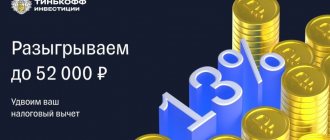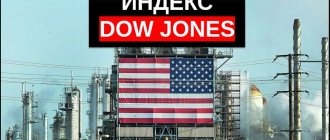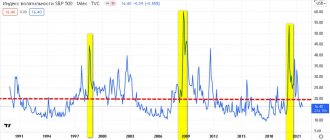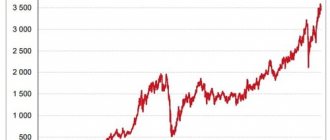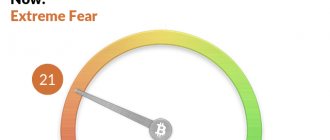What is MSCI Russia in simple words
MSCI (Morgan Stanley Capital International, “MSCIAI”) is a stock index that is part of the MSCI Emerging Markets (EM) group of emerging market indices.
MSCI ranks the best companies in the country. It is a direct reflection of the current economic situation of the state. Calculated in dollars.
MSCI Inc., an international analytical company, calculates MSCIAI values for developing countries. (formerly Morgan Stanley Capital International). As you might guess, MSCI Russia is an international index of Russian stocks. The provider is the MSCI Barra agency, established in 2004.
Created by MSCI Inc. was back in 1969. The company was then called Capital Group.
Why do companies strive to get into the index? They get into the index in order to attract money from passive investors.
MSCI Russia index tickers:
| System | Ticker |
| Bloomberg | Reuters |
| MXRU | .MIRU00000PUS |
Its values are publicly available and are updated every 15 seconds during the stock market.
For October 2022, the composition of the MSCI Russia index is as follows:
By sector in percentage:
Quotes from 2005 to 2022 are as follows:
Our stock market is not yet developed enough. Our index includes only 23 companies. In comparison, other developing countries have more companies:
- MSCI Taiwan – 87;
- MSCI India – 86;
- MSCI Thailand – 43;
Stock indices
To determine what the MSCI Russia index is, let’s first understand the concept of “index”.
Stock index is an indicator calculated based on quotes of selected stocks. Securities are selected based on a variety of criteria: territory, sector, etc. For example, the Moscow Exchange index (iMOEX) includes shares of the 50 largest companies represented on the trading platform of the same name.
The initial value of the index is taken as a conditional number, for example, 100 or 1000. To ensure that the prices of shares included in the index are comparable, they are multiplied by a special coefficient, for example, calculated on the basis of capitalization, so the company with the largest capitalization will have a greater influence on the change the entire index.
Exchange or stock indices allow you to evaluate the general direction of movement of the prices of shares included in the index, so the absolute values of the index are not particularly important, but the dynamics of change are what is important. Indexes can be useful, for example, as a guide (benchmark).
Rebalancing the MSCI Russia index - how often it happens
Scheduled rebalancing of the MSCI Russia index is done 4 times a year (once a quarter). As a rule, the most significant changes occur twice a year: in May and November.
The date of the index committee meeting is known in advance and is called the “annoucement date”. Once a rebalancing is announced, funds are given two weeks to implement it.
By the final date (called the Effective date), all funds must have time to rebalance. A new index calculation with new weights occurs.
Rarely, scale revisions can sometimes occur unplanned. This becomes known 1-2 days before the revision. These are emergency cases that may be caused by serious changes in the joint stock company. For example:
- Major purchase of another company;
- Sale of your package of securities;
- M&A transactions (mergers and acquisitions);
- Delisting from the exchange;
MSCI Russia 10/40 Index This is almost the same, but with additional conditions taking into account European investment fund standards. In MSCI Russia 10/40 there is a limit on the maximum weight of a company of 10%. The result is 4 main companies each with weights of 8-10%, the remaining 8 companies with weights of 4-5%. The restriction applies in accordance with the UCITS III directives (limitations for investment funds).
MSCI Indices
The index has many subcategories that demonstrate the state of the economy of different countries, sectors, and specific companies.
There are thousands of indices in the MSCI family, indicators adopted for use by 70 countries. The index offers comprehensive and customized calculations where analysis of quality, value, decline, size, volatility and momentum is required.
Despite the absence of a leading index, the World and EAFE gained the greatest popularity, and for Russia the regional MSCI Russia became more significant.
MSCI World Index
Started calculating on December 12, 1969. The starting point is 100 points. By 2016, the index reached 1,500 points.
MSCI represents more than 1,600 issuers, 23 countries with a total capitalization of $22 trillion, 85% free-float.
In February 2016, the World group united more than 6 thousand indices. After 23 developing countries, including Russia, entered the MSCI World, a new MSCI All Countries Index appeared, which included almost 2.5 thousand issuers with a total capitalization of $42 trillion.
MSCI EAFE
The index included shares of 926 companies from 21 developed countries (almost all members of the MSCI World Index, except the United States and Canada) with a capitalization of $12.4 trillion.
MSCI Emerging also includes Russia. The MSCI Russia index is presented separately, calculated taking into account the analysis of net price changes and dividends paid. The dynamics of the indicator are carefully monitored by market participants.
Formula and calculation MSCI Russia
What stocks are included in MSCI Russia? What are the requirements? The formula for calculating the index is kept secret, but some important indicators are known to everyone.
The calculation principles can be viewed in the “MSCI Global Investable Market Indexes Methodology” file, which is updated monthly on the index’s official website.
The following factors can be identified when determining the weight of shares in MSCI Russia:
- The company's market capitalization is at least $1.4 billion;
- The number of free float shares must be more than $700 million. The lower limit is $700 million, after which shares are excluded;
- The free float share must be at least 15% of capitalization. Moreover, the rounding goes up. For example, free float 15.01% or 19.99% gives the same inclusion factor of 0.20. Accordingly, the larger the FF, the more weight the company receives in the index;
- Availability for purchase by foreign investors.
- Share liquidity indicator. It is calculated based on the ATVR (Annual Traded Value Ratio) coefficient - the ratio of the average trading turnover per month to free-float based on indicators for 12 months.
When calculating the value, quotes for depositary receipts (ADR, GDR) are also taken into account.
The MSCI Russia index is calculated in dollars. It is based on ruble quotes in foreign currencies (according to ADR quotes).
The process of determining the index composition
1. Capitalization and free float of companies on the market are calculated
2. Starting from the top of the list of companies ranked by capitalization, shares are selected so that the free float capitalization of these companies is 85% of the market capitalization as a whole.
The specifics of the Russian market, namely the small number of issuers and the presence of giants, leads to a small number of shares in MSCI Russia. The free float of the Russian market is 16.8-17.2 trillion rubles, and MSCI Russia is 14.5 trillion rubles (exactly 85%).
In general, the capitalization level of 1.3-1.5 billion dollars, set by analysts, is a derivative of the 85% threshold. However, this level may be reduced to a minimum of $700 million.
If a positive development trend is observed on the Russian market, the number of shares in the index will increase due to the arrival of new companies.
Which companies are applying to be included in MSCI Russia
As of March 2022, the following shares of Russian issuers are eligible for inclusion:
- MMK;
- PEAK;
- Petropavlovsk;
- Polymetal (Polymetal) weight gain;
- RusHydro;
- Rostelecom;
- Rosseti;
- Rusal;
- AFK Sistema;
- OZON;
- Fix Price;
For investors, this information is important because index funds have a significant impact on stock prices, especially when weightings change significantly. This is due to the inflow/outflow of huge money from passive investors and funds into some individual companies.
- How to choose stocks for a beginner;
- What are passive investments;
- How to create an investment portfolio;
Analysts' opinions. About candidates for inclusion in MSCI Russia
Index provider MSCI will announce the results of the next semi-annual revision of the MSCI Russia index on the night of November 12, 2021 Moscow time . MSCI will use securities quotes at the close of one of the trading days on October 18–29 as cut-off prices during the November revision of indices. All changes will take effect on November 30th after the close of trading.
“Mail.ru may be excluded from the MSCI Russia index as part of the November semi-annual revision of MSCI indices,” says an analyst at VTB Capital. — Taking into account current quotes (at $19 per GDR), the company can be moved to the MSCI Russia Small Cap index (i.e., if the cut-off prices were taken at the market close on August 26, then the probability of Mail.ru getting into the small cap index would be 50/50.
If RusHydro (currently not a member of the MSCI index family) shows significantly worse performance than Mail.ru, then it will be included in the MSCI Russia Small Cap, while Mail.ru will remain in the main index.
In addition, PIK, MMK and Rusal are now considered as potential candidates for inclusion in the MSCI Russia index. Regarding changes in the MSCI Russia Small Cap index, we expect the inclusion of Segezha shares and Bashneft preferred shares in it in November.”
EPFR Global released flow data for the week ending Wednesday. Russian stocks and bonds showed net outflows of $80 million at the end of the week, up from $70 million the previous week—the second worst week since the beginning of the year.
The net outflow of capital from Russian shares by funds (taking into account all funds investing in Russian shares) during the reporting period amounted to $50 million compared to $60 million previously. In funds investing only in Russian shares, an outflow of funds in the amount of $80 million was recorded compared to the previous $120 million (11 weeks of outflows).
In Russian bonds, funds on the part of funds (taking into account all funds investing in Russian bonds) recorded a capital outflow of $30 million during the reporting period, compared to $20 million that went out earlier (the second worst week in terms of outflow in the third quarter). Russia-only bond funds saw outflows of $10 million, up from $5 million in the prior period.
“Last week was the worst week since July last year due to outflows from GEM equity and bond funds,” commented analysts at BCS Global Markets. — Russian funds also showed net outflows. Investor optimism regarding the short-term prospects in light of the expected tapering of QE is negative.”
TCS Group reported for the second quarter of 2022 under IFRS. Net profit grew by 45% y/y, net interest income by 22.6% y/y, assets by 13% y/y.
“The group is demonstrating high business growth rates,” comment Promsvyazbank analysts. — Total revenue in the second quarter increased by 37%, to 65.0 billion rubles. The share of activities not related to lending increased by 1 percentage point during the quarter, amounting to 44% of the group’s revenue. Return on equity reached 46.1%, which is almost twice as high as that of Sberbank (25.8%).
We note that the decrease in net interest margin for the first half of the year by 3.6 percentage points. (y/y) – up to 16.1% compensated by a decrease in the cost of risk (COR) by 9.8 percentage points. (y/y), up to 4.5%. Against this background, the group raised its profit forecasts for 2022 - it expects to earn 60 billion rubles. (RUB 55 billion previously). To further accelerate business growth and strengthen its technological leadership, the Group is ready for new M&A transactions in the sector of brokerage services, payments and services for SMEs, as well as entering foreign markets (South and Southeast Asia). Overall, we are positive about the development of the group’s business.”
Sovcomflot published financial statements for the first half of 2022. Sovcomflot's revenue in time charter equivalent (TCE) decreased by 28.5% YoY and amounted to $559.9 million, EBITDA decreased by 42.2% YoY, to $337. 2 million, adjusted net profit decreased 5 times and amounted to $59.2 million.
“Sovcomflot’s financial results deteriorated year-on-year against the backdrop of a strong base in 2022, but overall they turned out to be expected, so we assess them as neutral,” Promsvyazbank analysts note. — For the long-term strategy of investors, the company remains attractive, since we see business expansion over the horizon of several years due to the development of the industrial segment and transportation along the Northern Sea Route. In the short term, the driver of growth may be the restoration of oil production by the participants in the OPEC+ deal. We recommend “buy”, target price is 127 rubles. per share."
Read the best materials from BCS Express on Telegram
BCS World of Investments
MSCI Emerging market - what is it?
MSCI Emerging markets (abbreviated as “EM”) is an index reflecting the global index of emerging markets (24 countries in total). The largest representatives are: Brazil, India, China, South Africa, Russia, Korea.
Based on the calculated value, you can understand the movements of investment money.
The Emerging market collectively includes companies with a total capitalization of 85% of the global stock market in developing countries.
Emerging market quotes are as follows:
